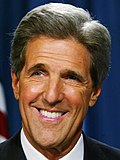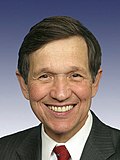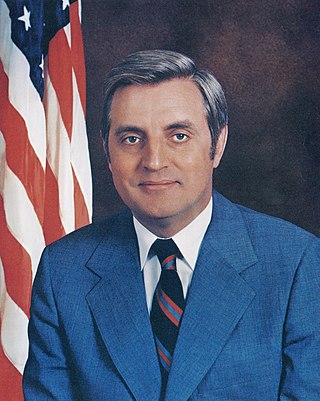
Walter Frederick "Fritz" Mondale was an American lawyer and politician who served as the 42nd vice president of the United States from 1977 to 1981 under President Jimmy Carter. A U.S. senator from Minnesota from 1964 to 1976, he was the Democratic Party's nominee in the 1984 presidential election, but lost to incumbent Ronald Reagan in an Electoral College and popular vote landslide.

Eugene Joseph McCarthy was an American politician, writer, and academic from Minnesota. He served in the United States House of Representatives from 1949 to 1959 and the United States Senate from 1959 to 1971. McCarthy sought the Democratic presidential nomination in the 1968 election, challenging incumbent Lyndon B. Johnson on an anti-Vietnam War platform. McCarthy unsuccessfully ran for U.S. president four more times.

Super Tuesday is the United States presidential primary election day in February or March when the greatest number of U.S. states hold primary elections and caucuses. Approximately one-third of all delegates to the presidential nominating conventions can be won on Super Tuesday, more than on any other day. The results on Super Tuesday are therefore a strong indicator of the likely eventual presidential nominee of each political party.
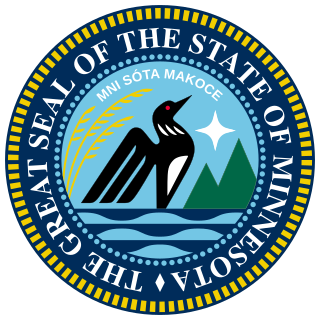
The Minnesota Legislature is the bicameral legislature of the U.S. state of Minnesota consisting of two houses: the Senate and the House of Representatives. Senators are elected from 67 single-member districts. In order to account for decennial redistricting, members run for one two-year term and two four-year terms each decade. They are elected for four-year terms in years ending in 2 and 6, and for two-year terms in years ending in 0. Representatives are elected for two-year terms from 134 single-member districts formed by dividing the 67 senate districts in half.

The 2004 United States presidential election was the 55th quadrennial presidential election, held on Tuesday, November 2, 2004. The Republican ticket of incumbent President George W. Bush and his running mate incumbent Vice President Dick Cheney were elected to a second term, defeating the Democratic ticket of John Kerry, a United States senator from Massachusetts and his running mate John Edwards, a United States senator from North Carolina.
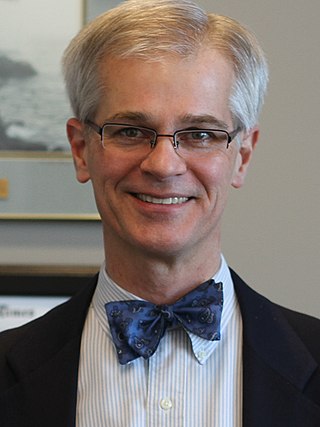
John J. Marty is a member of the Minnesota Senate, representing District 40, which includes parts of Ramsey County in the northern Twin Cities metropolitan area. As a young state senator, he ran for governor of Minnesota in 1994. He won the DFL nomination and the Democratic primary but lost the general election to the incumbent governor, Arne Carlson. Marty ran for governor again in 2010, but withdrew from the race after failing to win his party's endorsement.
Minnesota's 1st congressional district extends across southern Minnesota from the border with South Dakota to the border with Wisconsin. It is a primarily rural district built on a strong history of agriculture, though this is changing rapidly due to strong population growth in the Rochester combined statistical area. The district is also home to several of Minnesota's major mid-sized cities, including Rochester, Mankato, Winona, Austin, Owatonna, Albert Lea, Red Wing, New Ulm, Worthington, and Lake City. It is represented by Republican Brad Finstad.

The 2004 United States presidential election in Minnesota took place on November 2, 2004 as part of the 2004 United States presidential election. Voters chose ten representatives, or electors to the Electoral College, who voted for president and vice president.

The 2006 Minnesota's 5th congressional district election was an election for the United States House of Representatives for the open seat of incumbent Martin Olav Sabo (DFL), who retired after serving the Minneapolis-based district for 28 years.

Minnesota is known for a politically active citizenry, with populism being a longstanding force among the state's political parties. Minnesota has consistently high voter turnout; in the 2008 U.S. presidential election, 77.8% of eligible Minnesotans voted – the highest percentage of any U.S. state or territory – versus the national average of 61.7%. This was due in part to its same day voter registration laws; previously unregistered voters can register on election day, at their polls, with evidence of residency.

The 2004 presidential campaign of John Edwards, U.S. Senator from North Carolina, began on September 16, 2003.

The 2008 United States presidential election in Minnesota took place on November 4, 2008, and was part of the 2008 United States presidential election. Voters chose ten representatives, or electors to the Electoral College, who voted for president and vice president.

The 2004 Minnesota House of Representatives election was held in the U.S. state of Minnesota on November 2, 2004, to elect members to the House of Representatives of the 84th Minnesota Legislature. A primary election was held on September 14, 2004.
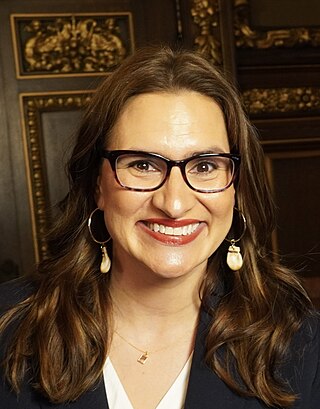
Peggy Flanagan is an American politician, community organizer, and Native American activist serving as the 50th lieutenant governor of Minnesota since 2019. A member of the Minnesota Democratic–Farmer–Labor Party (DFL), Flanagan served in the Minnesota House of Representatives from 2015 to 2019.
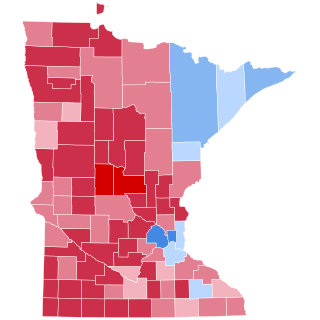
The 2016 United States presidential election in Minnesota was held on Tuesday, November 8, 2016, as part of the 2016 United States presidential election in which all 50 states plus the District of Columbia participated. Minnesota voters chose electors to represent them in the Electoral College via a popular vote, pitting the Republican Party's nominee, businessman Donald Trump, and running mate Indiana Governor Mike Pence against Democratic Party nominee, former Secretary of State Hillary Clinton, and her running mate Virginia Senator Tim Kaine. Minnesota has ten electoral votes in the Electoral College.

The 1916 United States presidential election in Minnesota took place on November 7, 1916 as part of the 1916 United States presidential election. Minnesota voters chose 12 electors to the Electoral College, which selected the president and vice president. Minnesota held its first Presidential Primary on March 14, 1916.

Dean Benson Phillips is an American businessman, politician, and former candidate for the 2024 Democratic Party presidential nomination who has served as the U.S. representative from Minnesota's 3rd congressional district since 2019. Phillips's district encompasses the western suburbs of the Twin Cities, such as Bloomington, Minnetonka, Edina, Maple Grove, Plymouth, and Eden Prairie. A member of the Democratic Party, Phillips has both owned and started several companies in addition to serving as president and CEO of his family's liquor business, the Phillips Distilling Company. He is the former co-owner of Talenti gelato and co-owns Penny's Coffee. On November 24, 2023, Phillips announced that he would not run for reelection to his congressional seat.

The 2020 United States presidential election in Minnesota was held on Tuesday, November 3, 2020, as part of the 2020 United States presidential election in which all 50 states plus the District of Columbia participated. Minnesota voters chose electors to represent them in the Electoral College via a popular vote, pitting the Republican Party's nominee, incumbent President Donald Trump, and running mate Vice President Mike Pence against the Democratic Party nominee, former Vice President Joe Biden, and his running mate California Senator Kamala Harris. Minnesota has ten electoral votes in the Electoral College.

The 2022 Minnesota Secretary of State election was held on November 8, 2022, to elect the Secretary of State of Minnesota. Incumbent DFLer Steve Simon won re-election to a third term.


